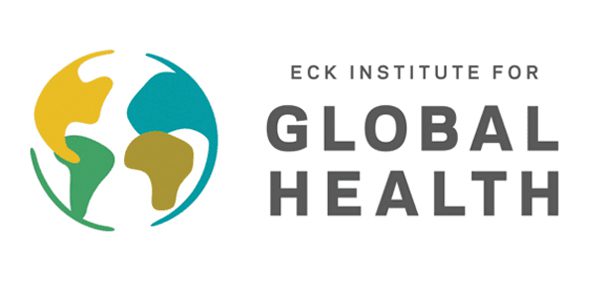Where We’re Going – Healthcare: Campus Viewpoint
Subscribe to the ThinkND podcast on Apple, Spotify, or Google.
Featured Speakers:
- William Evans, Keough-Hesburgh Professor of Economics, Co-founder of the Lab for Economic Opportunities, University of Notre Dame
- Krista Foster, Assistant Professor, IT, Analytics, and Operations, Mendoza College of Business, University of Notre Dame
- Dr. Bernard Nahlen, Director, Eck Institute for Global Health, University of Notre Dame
- Dominic Vachon, The John G. Sheedy, M.D., Director of the Ruth M. Hillebrand Center for Compassionate Care in Medicine, University of Notre Dame
For the first week of the “Where We’re Going: Healthcare” series, moderator Dr. Bernard Nahlen, Director, Eck Institute for Global Health brought in Notre Dame faculty who are experts in public health and healthcare technology. The focus this week was the Notre Dame campus viewpoint on how Covid-19 has affected healthcare, and how this will change the future of healthcare indefinitely.
Nahlen was joined by Dominic Vachon, The John G. Sheedy, M.D., Director of the Ruth M. Hillebrand Center for Compassionate Care in Medicine. Vachon works to implement compassion in medicine through the science of compassion, and through the viewpoint that clinicians should be trained for this work starting in their undergraduate years. He was also joined by Krista Foster, Assistant Professor, IT, Analytics, and Operations, Mendoza College of Business, whose research focuses on emergency physicians, their performance, patient satisfaction, medical malpractice and more. Essentially, she studies operational changes that can make healthcare delivery more efficient. The final guest, William Evans Keough-Hesburgh Professor of Economics and co-founder of the Lab for Economic Opportunities, focuses on evidence-based solutions to poverty.
After guests were introduced, Evans was asked to discuss some of the healthcare disparities that Covid-19 has divulged to the public. He explained that for elderly people as well as minorities, there are extreme disparities regarding death rates in Covid. In particular, he stated “Minority elderly groups are dying at twice the rate of non-hispanic whites.” A particularly staggering statistic is that people living in nursing homes account for 40% of deaths from Covid. Evans then went into a discussion regarding excess mortality. He defined excess mortality as the number of deaths that have been recorded from the pandemic in comparison to the number of deaths that would be expected in comparison to historical data. He stated that mortality is substantially higher in 2020 than it was before, and it follows that a substantial amount of these deaths are Covid-related. Interestingly, there are also non-Covid causes of death that are also related to the pandemic in a way. This can be due to the social isolation implementations. In younger populations, drug use and suicides are of particular concern. In older populations, those living with Alzheimer’s have suffered death substantially. This can further be accounted for by the lack of regular medical care that the pandemic introduced. For example, normal diagnostic testing has been widely avoided due to concerns about going to in-person doctor’s appointments.
Next, Foster explained the healthcare trends that we have and will continue to see due to the pandemic. The first trend she mentioned is the increase in telehealth usage. Moreover, more urgent care facilities have been created. Another trend is the treatment of patients by physician’s assistants as well as nurse practitioners in order to alleviate some pressure off of medical doctors.
She then explained how medical malpractice claims affect medicine. She made a point to say that malpractice lawsuits are very stressful of doctors, and that they often did not commit a wrongdoing to provoke the lawsuits. Also, according to her study, once named in a lawsuit, physician behavior does not necessarily change. Also, interestingly, after a physician was named in a lawsuit, patient satisfaction scores were higher. This could reflect an increase in bedside manner or compassion shown as a result of the lawsuit.
Vachon then discussed compassion in healthcare. He stated, When you practice in a compassion-centered way, everything gets better.” Both medical outcomes and patient satisfaction increase as a result of compassion in medicine. Furthermore, physicians benefit from practicing compassion. Compassion is biologically innate in humans; to avoid compassion is to deny oneself a necessary component of life. The trend of telehealth will absolutely change the way compassion in medicine looks, however medicine is evolving with this change.
As a final question, Nahlen asked the guests what gives them hope and concern for the future. Evans stated that he is hopeful this situation will be a learning experience. Specifically, he hopes to focus on how we failed seniors in nursing homes so miserably during this time. Foster is concerned about access to telemedicine going forward. She is hopeful about the increasing use of data to make decisions. Vachon is worried about exhaustion and demoralization of people in healthcare. However, he is hopeful that we will all focus more on compassion to combat these issues.
- “Just because a physician is named in a medical malpractice lawsuit does not actually mean that there is any wrongdoing that has happened.” (Krista Foster, 15:10)
- There are very high mortality rates for the elderly as well as minorities—particularly minority men—from Covid. (15:30)
- “Minority elderly groups are dying at twice the rate of non-hispanic whites.” (William Evans, 16:20)
- “40% of the deaths from Covid have been from people in nursing homes.” (William Evans, 16:50)
- Excess Mortality is the number of deaths that have been recorded from the pandemic in comparison to the number of deaths that would be expected in comparison to historical data. (18:03)
- Telemedicine is increasing in popularity due to the pandemic, and this trend will likely continue. (21:51)
- “When you practice in a compassion-centered way, everything gets better.” (Dominic Vachon, 29:10)
- Both medical outcomes and patient satisfaction increase as a result of compassion in medicine. (29:35)
- Compassion is something that can be taught and practiced in medicine. (31:55)
- “Compassion helps you keep balanced, mentally focused, and motivated.” (Dominic Vachon, 32:20)
Related Content
ND Research Explores: The Eck Institute for Global Health
The University of Notre Dame’s Eck Institute for Global Health (EIGH), under the direction of Bernard Nahlen, serves as a university-wide enterprise that recognizes health as a...
watch videoThe Science of Compassion in Medicine: 20 Major Claims of ‘How Doctors Care’
The empirical evidence for the importance of compassionate caring in health care continues to accumulate. The science of compassion requires fundamental assumptions of the...
watch videoWhat is Compassion Science in Medicine?
The Hillebrand Center at Notre Dame works to restore the spirit of compassion in healthcare by advancing the application of the science of compassion at every level of medical...
watch video

